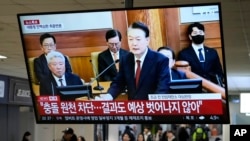ສານລັດຖະທຳມະນູນຂອງ ເກົາຫຼີໃຕ້ ໃນວັນອັງຄານວານນີ້ ໄດ້ພິຈາລະນາຄຳຖະແຫຼງໃນຄະດີຟ້ອງຮ້ອງປະທານາທິບໍດີ ຢູນ ຊຸກ ຢອລ ເປັນຄັ້ງສຸດທ້າຍ.
ການຕັດສິນຂອງສານ ກ່ຽວກັບວ່າ ທ່ານ ຢູນ ຈະໄດ້ກັບຄືນໄປດຳລົງຕຳແໜ່ງ ຫຼື ຖືກປົດອອກນັ້ນ ແມ່ນຄາດວ່າ ຈະເປັນກາງເດືອນມີນາ.
ທ່ານ ຢູນ ໄດ້ປະຕິເສດວ່າ ທ່ານບໍ່ໄດ້ເຮັດຫຍັງຜິດ ເວລາທ່ານປະກາດກົດໄອຍະການເສິກ ເມື່ອວັນທີ 3 ທັນວາທີ່ຜ່ານມາ. ໃນຄຳຖະແຫຼງປິດຂອງທ່ານ ໃນວັນອັງຄານວານນີ້ ທ່ານໄດ້ປ້ອງກັນການປະກາດນັ້ນ, ໂດຍເວົ້າວ່າ ມັນແມ່ນ “ການປະກາດວ່າ ປະເທດກຳລັງປະເຊີນກັບວິກິດການທີ່ມີຢູ່ນັ້ນ.”
ທ່ານໄດ້ບອກສານວ່າ “ກຳລັງພາຍນອກ, ລວມທັງ ເກົາຫຼີເໜືອ, ພ້ອມກັບອົງປະກອບທີ່ຕໍ່ຕ້ານລັດຢູ່ພາຍໃນສັງຄົມຂອງພວກເຮົາ” ແມ່ນ “ກຳລັງເຮັດວຽກຮ່ວມກັນເພື່ອຂົ່ມຂູ່ຄວາມໝັ້ນຄົງ ແລະ ອຳນາດອະທິປະໄຕຂອງປະເທດເຮົາຢ່າງຮ້າຍແຮງ.”
ສະພາແຫ່ງຊາດທີ່ຖືກຄວບຄຸມໂດຍຝ່າຍຄ້ານເສລີທິປະໄຕ ໄດ້ຟ້ອງຮ້ອງທ່ານ ຢູນ, ເຊິ່ງແມ່ນຫົວອະນຸລັກນິຍົມ, ຫຼັງຈາກການປະກາດກົດໄອຍະການເສິກໄລຍະສັ້ນຂອງທ່ານ ເມື່ອວັນທີ 3 ທັນວາ. ເຂົາເຈົ້າໄດ້ກ່າວຫາທ່ານ ຢູນ ກ່ຽວກັບ ການໃຊ້ມາດຕະການພິເສດ, ເຊິ່ງແມ່ນຖືກຮັກສາໄວ້ເພື່ອເຫດການສຸກເສີນຂອງປະເທດ ຫຼື ເວລາເກີດສົງຄາມ, ໂດຍບໍ່ມີເຫດຜົນອັນສົມຄວນ.
ໃນຖະແຫຼງການຂອງທ່ານ, ທ່ານ ຢູນ ໄດ້ກ່າວວ່າທ່ານ “ບໍ່ສາມາດລະເລີຍວິກິດການທີ່ຕ້ອງຕັດສິນຊະຕາກຳຂອງປະເທດນີ້ໄດ້ອີກຕໍ່ໄປ” ແລະ ທ່ານ “ພະຍາຍາມແຈ້ງໃຫ້ປະຊາຊົນຊາບເຖິງການກະທຳອັນຊົ່ວຮ້າຍ ທີ່ພັກຝ່າຍຄ້ານຂະໜາດໃຫຍ່ຕໍ່ຕ້ານລັດ ແລະ ຮຽກຮ້ອງໃຫ້ປະຊາຊົນຢຸດການກະທຳດັ່ງກ່າວ ດ້ວຍການເຝົ້າຕິດຕາມ ແລະ ຕຳໜິວິຈານ.”
ທ່ານ ຢູນ ໄດ້ກ່າວວ່າ ບັນດາພັກຝ່າຍຄ້ານໄດ້ກີດກັ້ນການທົບທວນຄືນກົດໝາຍຕໍ່ຕ້ານການສອດແນມ, ປ້ອງກັນການລົງໂທດຄົນຕ່າງປະເທດທີ່ທຳການສອດແນມໃນ ເກົາຫຼີໃຕ້.
ທ່ານໄດ້ກ່າວຕໍ່ສານໃນວັນອັງຄານວານນີ້ວ່າ “ນີ້ບໍ່ເຄີຍເປັນການຕັດສິນໃຈສຳລັບຜົນປະໂຫຍດສ່ວນຕົວຂອງຂ້າພະເຈົ້າ.”
ພັກປົກຄອງ ອຳນາດປະຊາຊົນ ຫຼື PPP ໄດ້ຜັກດັນໃຫ້ມີການແກ້ໄຂກົດໝາຍເພື່ອຂະຫຍາຍຂອບເຂດຂອງເຂົາເຈົ້າຈາກການແນເປົ້າໃສ່ “ລັດທີ່ເປັນສັດຕູ” ເພື່ອລວມເອົາ “ຕ່າງປະເທດ,” ໂດຍອ້າງເຖິງໄພຂົ່ມຂູ່ທີ່ເກີດຈາກການສອດແນມຂອງ ຈີນ. ພັກຝ່າຍຄ້ານປະຊາທິປະໄຕແຫ່ງ ເກົາຫຼີ ຫຼື DPK ໄດ້ກີດກັນການທົບທວນນັ້ນ ເພາະຢ້ານ ກ່ຽວກັບຄວາມເປັນໄປໄດ້ຂອງການໃຊ້ກົດໝາຍໃນທາງທີ່ຜິດ.
ອ່ານຂ່າວນີ້ເປັນພາສາອັງກິດ
South Korea's Constitutional Court on Tuesday heard the last of the oral arguments in President Yoon Suk Yeol's impeachment trial.
The court's decision on whether Yoon will be reinstated or removed from office is expected by mid-March.
Yoon has denied that he did anything wrong when he declared martial law on December 3. In his closing statement Tuesday, he defended the declaration, saying it was a "proclamation that the nation was facing an existential crisis."
He told the court that "external forces, including North Korea, along with anti-state elements within our society" were "working together to seriously threaten our national security and sovereignty."
The liberal opposition-controlled National Assembly impeached Yoon, a conservative, after his short-lived Dec. 3 martial law decree. They accused Yoon of taking the extraordinary measure, which is reserved for national emergencies or times of war, without proper justification.
In his statement, Yoon said he "could no longer neglect a do-or-die crisis facing this country" and that he had "tried to inform the people of these anti-state acts of wickedness by the mammoth opposition party and appealed to the people to stop it with their surveillance and criticism."
Yoon had said the opposition parties blocked a revision to anti-espionage law, preventing the prosecution of foreign nationals spying on South Korea.
"This was never a decision made for my personal benefit," he told the court Tuesday.
The ruling People Power Party (PPP) pushed for an amendment to the law to broaden its scope from targeting "enemy states" to include "foreign countries,” citing threats posed by Chinese espionage. The opposition Democratic Party of Korea (DPK) blocked the revision for fear of potential misuse of the law.





ຟໍຣັມສະແດງຄວາມຄິດເຫັນ